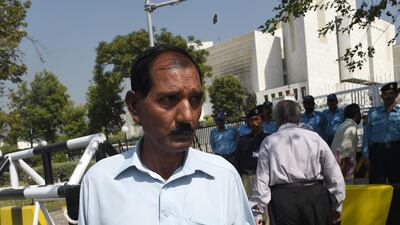Pakistan's government has failed to provide support to the family of a Christian woman convicted of blasphemy, the husband of Asia Bibi told The National.
Ms Bibi, 47, was convicted in 2010 for allegedly making derogatory remarks about Islam. On Wednesday she was acquitted of all charges by Pakistan's Supreme Court, sparking protests by Islamist hardliners Tehreek-e-Labbaik (TLP) who paralysed the country for three days blocking roads and disrupting traffic in major cities.
The protesters, however, ended their action on Friday night after Prime Minister Imran Khan's government reached a controversial deal to put Ms Bibi on the no-fly list and saying it would not object to an appeal against the verdict, which was filed earlier in the Supreme Court. TLP spokesman Ejaz Ashrafi told The National there would be nationwide protests if the government allowed Ms Bibi to leave the country.
“We are at the losing end, even after winning the case, the agreement made by the state with Islamists has really disappointed us," said Ms Bibi's husband Ashiq Masih on Monday. "No government institution has contacted us for our safety and shown any sympathy to us."
_______________
Read more:
Pakistan agrees to review of Asia Bibi acquittal after protests
Woman acquitted of blasphemy to leave Pakistan
_______________
Blasphemy is a massively inflammatory charge in Muslim-majority Pakistan, where even unproven allegations of insulting Islam and its Prophet Mohammed can provoke death at the hands of vigilantes.
The father of four on Sunday called on President Donald Trump to help the family leave Pakistan.
“My daughters' ask: when we will go to meet our mother? And I had no answer,” said Mr Masih.
The family has been under added pressure following the departure on Monday of their lawyer Saif-ul-Malook.
Mr Malook, who has fled to the Netherlands, said he contacted a United Nations official in Islamabad after violence erupted following the Pakistani Supreme Court's acquittal of Ms Bibi.
"And then they (the UN) and the European nation ambassadors in Islamabad, they kept me for three days and then put me on a plane against my wishes," the lawyer told a press conference in The Hague. The lawyer said a UN official in Pakistan told him "we are taking care of her" but that "when I said which country, they said we can't say.
Ms Bibi's family member Qamar Rafiq told The National they had been kept in the dark regarding the state of their jailed relative. "Since the verdict has been announced, we've demanded access to her and...security for ourselves," he said.
Despite Mr Khan's agreement with Islamist hardliners and the latter's review petition, the court's judgement has not been suspended, Osama Malik, a legal expert at Islamabad High Court, told The National. "The last line of the unanimous judgement authored by the Chief Justice of Pakistan Mr Saqib Nisar, that sets aside Asia Bibi's conviction, states:She be released from jail forthwith, if not required in any other criminal case."
“Despite that, Asia is not free. She is still in custody, and has not been allowed to travel or to even get a passport, in clear contravention of the Supreme Court's orders,” Mr Malik said.
Ms Bibi’s case has hugely divided Pakistan, even leading to the murder of two politicians who defended her. One of them, Punjab governor Salman Taseer, was killed by his bodyguard in Islamabad in 2011.
Ms Bibi's saga reflects the challenges faced by Pakistan's Christian minority - which comprises just 2.6 per cent of the Muslim-majority country of 208 million people - amid growing intolerance and radical Islamist groups.
"The country's foundations were based on the minorities' rights with religious freedom, the state needs to take a bold step in the Asia Bibi case to ensure the rights declared in the constitution of Pakistan and help minorities of the country to feel secure," Kapil Dev, a minorities rights activists told The National.

